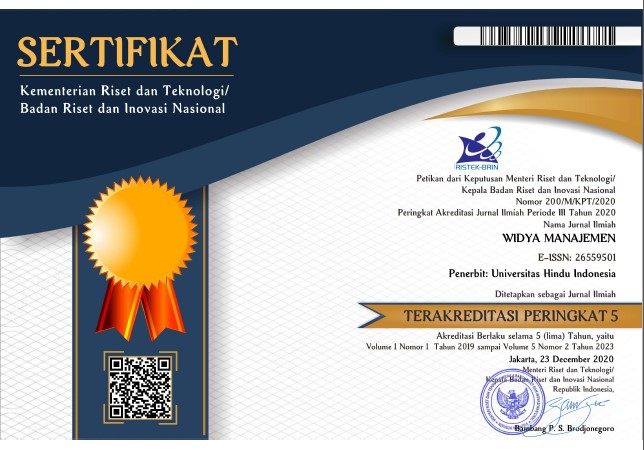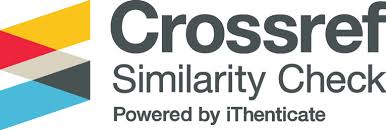Pengaruh Social Media Customer Engagement Dan Kepuasan Pelanggan Terhadap Loyalitas Merek Perguruan Tinggi Swasta
Abstract
The broader use of the internet and the behavior of social media users have a significant influence on business management and higher education. Communication and interaction between customers and the company become more open and faster. This study aims to analyze the effect of social media customer engagement and student and alumni satisfaction on college loyalty as a brand and the role of student and alumni satisfaction as a mediator. The research uses a survey method conducted on 220 students and alumni of a leading tourism college in Jakarta who are followers of the college's Instagram account. Analisis data using SEM (StructuralEquation Model) revealed the research results that social media customer engagement significantly influences increasing loyalty to the college. Student and alumni satisfaction significantly influences increasing loyalty to the college and being a mediator that significantly influences customer engagement towards student and alumni loyalty.
References
Abuljadail, M., & Ha, L. (2019). Engagement and brand loyalty through social capital in social media. International Journal Internet Marketing and Advertising, 13(3).
Al-msallam, S. (2015). Customer Satisfaction and Brand Loyalty in the Hotel Industry. European Scientific Journal, ESJ, 11(10). https://doi.org/10.5281/zenodo.3461457
Andonova, Y., Miller, E. G., & Diamond, W. D. (2015). The Relationships among Self-Brand Congruence, Brand Attachment, Customer Engagement, and Brand Loyalty BT - Ideas in Marketing: Finding the New and Polishing the Old. In K. Kubacki (Ed.), Developments in Marketing Science: Proceedings of the Academy of Marketing Science (p. 816). Springer International Publishing.
APJII. (2020). LAPORAN SURVEI INTERNET APJII 2019 – 2020 (Q2). In Asosiasi Penyelenggara Jasa Internet Indonesia (Vol. 2020). https://apjii.or.id/survei
Aprilya, T. (2017). Strategi Komunikasi Pemasaran Nadyasfashop Melalui Instagram Dalam Meningkatkan Kepercayaan Customer Di Samarinda. EJournal Ilmu Komunikasi, 5(1), 13–23. http://ejournal.ilkom.fisip-unmul.ac.id/site/wp-content/uploads/2017/01/Jurnal Cetak (01-20-17-06-48-55).pdf
Brodie, R. J., Hollebeek, L. D., Juric, B., & Ilic, A. (2011). Customer Engagement : Conceptual Domain, Fundamental Propositions, and Implications for Research. Journal of Service Research, 13(3), 252–271. https://doi.org/10.1177/1094670511411703
Brodie, R. J., Ilic, A., Juric, B., & Hollebeek, L. (2013). Consumer Engagement in a Virtual Brand Community: An Exploratory Analysis. Journal of Business Research, 66(1), 105–114. https://doi.org/10.1016/j.jbusres.2011.07.029
Carvalho, A., & Fernandes, T. (2018). Understanding Customer Brand Engagement With Virtual Social Communities: a Comprehensive Model of Drivers, Outcomes and Moderators. Journal of Marketing Theory and Practice, 26(1–2), 23–37. https://doi.org/10.1080/10696679.2017.1389241
Dessart, L., & Veloutsou, C. (2018). Unveiling Heterogeneous Engagement-Based Loyalty in Brand Communities. European Journal of Marketing, 53(9), 1854–1881. https://doi.org/10.1108/EJM-11-2017-0818
Greve, G. (2014). The Moderating Effect of Customer Engagement on the Brand Image – Brand Loyalty Relationship. Procedia - Social and Behavioral Sciences, 148, 203–210. https://doi.org/10.1016/j.sbspro.2014.07.035
Instagram users in Indonesia - January 2020 | NapoleonCat. (n.d.). Retrieved December 11, 2020, from https://napoleoncat.com/stats/instagram-users-in-indonesia/2020/01#
Kosiba, J. P. B., Boateng, H., Amartey, A. F. O., Boakye, R. O., & Hinson, R. (2018). Examining customer engagement and brand loyalty in retail banking The trustworthiness influence loyalty. International Journal of Retail & Distribution Management. https://doi.org/10.1108/IJRDM-08-2017-0163
Kurniawati, D., & Arifin, N. (2015). Strategi Pemasaran Melalui Media Sosial dan Minat Beli Mahasiswa. Jurnal Simbolika : Research and Learning in Communication Study, 1(2).
Li, M., Teng, H., & Chen, C. (2020). Journal of Hospitality and Tourism Management Unlocking the customer engagement-brand loyalty relationship in tourism social media : The roles of brand attachment and customer trust. Journal of Hospitality and Tourism Management, 44(November 2019), 184–192. https://doi.org/10.1016/j.jhtm.2020.06.015
Liao, S. H., Chung, Y. C., Hung, Y. R., & Widowati, R. (2010). The impacts of brand trust, customer satisfaction, and brand loyalty on word-of-mouth. IEEM2010 - IEEE International Conference on Industrial Engineering and Engineering Management, April 2015, 1319–1323. https://doi.org/10.1109/IEEM.2010.5674402
Mahayasa, I. G. A., & Martayanti, N. M. P. (2020). Analysis Of The Influence Of Member's Commitment And Satisfaction On Loyalty Of Cooperative Members. Warmadewa Management and Business Journal (WMBJ), 2(1), 48-55.
Ogilvie, J., Agnihotri, R., Rapp, A., & Trainor, K. (2018). Social media technology use and salesperson performance: A two study examination of the role of salesperson behaviors, characteristics, and training. Industrial Marketing Management, 75(March), 55–65. https://doi.org/10.1016/j.indmarman.2018.03.007
Özata, F. Z., & Lujja, A. (2017). The Consequences of Consumer Engagement in Social Networking Sites. Business and Economics Research Journal, 8(2), 275–291. https://doi.org/10.20409/berj.2017.50
Petzer, D. J., & van Tonder, E. (2019). Loyalty Intentions and Selected Relationship Quality Constructs: The Mediating Effect of Customer Engagement. International Journal of Quality and Reliability Management, 36(4), 601–619. https://doi.org/10.1108/IJQRM-06-2018-0146
Rahmawati, E., & Aji, S. (2016). Pengaruh Customer Engagement Terhadap Kepuasan Pelanggan Dan Kepercayaan Merek Serta Dampaknya Pada Loyalitas Merek. Jurnal Riset Ekonomi Dan Manajemen, 15(2), 246. https://doi.org/10.17970/jrem.15.150204.id
Rather, R. A. (2019). Consequences of Consumer Engagement in Service Marketing: An Empirical Exploration. Journal of Global Marketing, 32(2), 116–135. https://doi.org/10.1080/08911762.2018.1454995
Saeed, R., Lodhi, R. N., Mehmood, A., Ishfaque, U., Dustgeer, F., Sami, A., Mahmood, Z., & Ahmad, M. (2013). Effect of Brand Image on Brand Loyalty and Role of Customer Satisfaction in it. World Applied Sciences Journal, 26(10), 1364–1370. https://doi.org/10.5829/idosi.wasj.2013.26.10.1343
Santoso, A. P., Baihaqi, I., & Persada, S. F. (2017). Pengaruh Konten Post Instagram terhadap Online Engagement: Studi Kasus pada Lima Merek Pakaian Wanita. JURNAL TEKNIK ITS, 6(1).
So, K. K. F., King, C., Sparks, B. A., & Wang, Y. (2014). The Role of Customer Engagement in Building Consumer Loyalty to Tourism Brands. Journal of Travel Research, 1–15. https://doi.org/10.1177/0047287514541008
Ting, D. H., Abbasi, A. Z., & Ahmed, S. (2020). Examining the mediating role of social interactivity between customer engagement and brand loyalty engagement. Asia Pacific Journal of Marketing and Logistics. https://doi.org/10.1108/APJML-10-2019-0576
Vargo, S. L., & Lusch, R. F. (2004). Evolving to a New Dominant Logic for Marketing. Journal of Marketing, 68(1), 1–17. https://doi.org/10.1509/jmkg.68.1.1.24036
Wilson, A., Carlson, B., & Sciascia, A. (2017). Reterritorialising social media: Indigenous people rise up. Australasian Journal of Information Systems, 21(Kamelamela 2016), 1–4. https://doi.org/10.3127/ajis.v21i0.1591
Yamin, S., & Kurniawan, H. (2009). Structural Equation Modelling. Salemba Infotek.
Zheng, X., Cheung, C. M. K., Lee, M. K. O., & Liang, L. (2015). Building brand loyalty through user engagement in online brand communities in social networking sites. Information Technology and People, 28(1), 90–106. https://doi.org/10.1108/ITP-08-2013-0144
Reproduction Policy
Every author submitting articles to Widya Manajemen must make a statement that the manuscript is free from plagiarism and is not being considered and published in other journals.
Articles that have been published are copyrighted by the Program Studi Manajemen FEBP UNHI. For educational purposes, the contents of the article may be duplicated or reproduced as long as the source of the article is mentioned. Written requests must be submitted to the editor to obtain permission to republish the contents of the article for purposes other than educational purposes.
-----------------------------------------------------------------------------------------------------
Kebijakan Reproduksi
Setiap penulis yang menyerahkan artikel ke Widya Manajemen harus membuat surat pernyataan bahwa naskahnya bebas dari plagiarisme dan tidak sedang dipertimbangkan dan dimuat dalam jurnal lain.
Artikel yang telah dipublikasi menjadi hak cipta Program Studi Manajemen FEBP UNHI. Untuk tujuan edukatif, isi dari artikel dapat digandakan atau direpublikasi selama menyebutkan sumber dari artikel tersebut. Permintaan tertulis harus diajukan kepada editor untuk memperoleh ijin merepublikasi isi dari artikel untuk tujuan lainnya selain tujuan edukatif.






.jpg)









